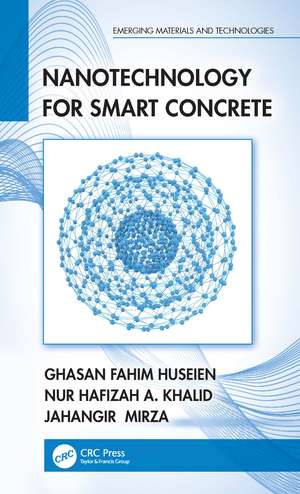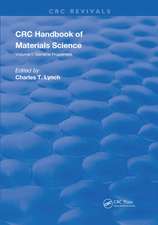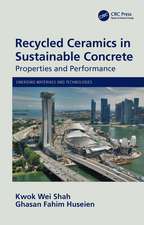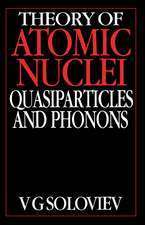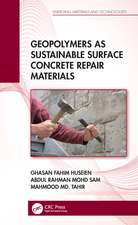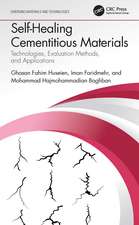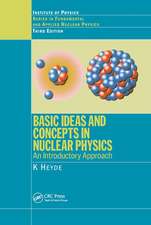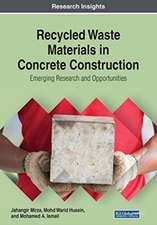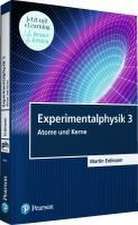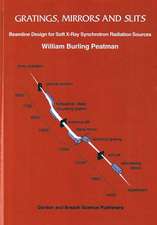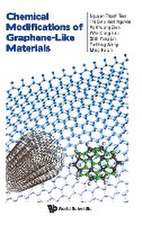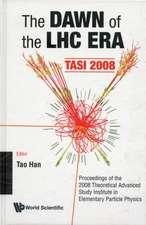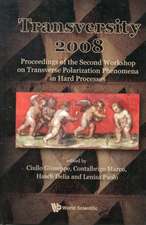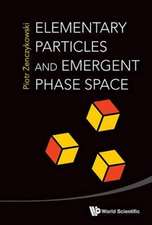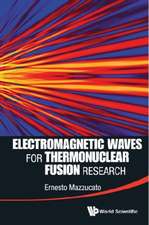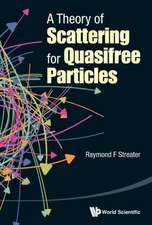Nanotechnology for Smart Concrete: Emerging Materials and Technologies
Autor Ghasan Fahim Huseien, Nur Hafizah A. Khalid, Jahangir Mirzaen Limba Engleză Hardback – 11 feb 2022
- Analyzes the linkage of concrete materials with nanomaterials and nanostructures
- Discusses applications of nanomaterials in the concrete industry, including energy storage in green buildings, anti-corrosive coatings, and inhibiting pathogens and viruses
- Covers self-healing concrete
- Explores safety considerations, sustainability, and environmental impact of nanoconcrete
- Includes an appendix of solved questions
| Toate formatele și edițiile | Preț | Express |
|---|---|---|
| Paperback (1) | 311.57 lei 6-8 săpt. | |
| CRC Press – 4 oct 2024 | 311.57 lei 6-8 săpt. | |
| Hardback (1) | 763.50 lei 6-8 săpt. | |
| CRC Press – 11 feb 2022 | 763.50 lei 6-8 săpt. |
Din seria Emerging Materials and Technologies
- 9%
 Preț: 729.09 lei
Preț: 729.09 lei -
 Preț: 381.32 lei
Preț: 381.32 lei - 9%
 Preț: 934.94 lei
Preț: 934.94 lei -
 Preț: 358.40 lei
Preț: 358.40 lei - 9%
 Preț: 640.26 lei
Preț: 640.26 lei - 9%
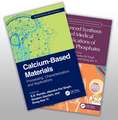 Preț: 1727.60 lei
Preț: 1727.60 lei - 9%
 Preț: 766.44 lei
Preț: 766.44 lei - 9%
 Preț: 763.50 lei
Preț: 763.50 lei - 9%
 Preț: 641.13 lei
Preț: 641.13 lei - 9%
 Preț: 831.98 lei
Preț: 831.98 lei - 9%
 Preț: 696.13 lei
Preț: 696.13 lei - 18%
 Preț: 777.00 lei
Preț: 777.00 lei - 18%
 Preț: 1111.49 lei
Preț: 1111.49 lei - 18%
 Preț: 992.90 lei
Preț: 992.90 lei - 18%
 Preț: 996.81 lei
Preț: 996.81 lei - 18%
 Preț: 897.02 lei
Preț: 897.02 lei - 18%
 Preț: 1112.29 lei
Preț: 1112.29 lei - 18%
 Preț: 895.78 lei
Preț: 895.78 lei - 18%
 Preț: 885.11 lei
Preț: 885.11 lei - 25%
 Preț: 710.83 lei
Preț: 710.83 lei - 18%
 Preț: 889.52 lei
Preț: 889.52 lei - 18%
 Preț: 1053.98 lei
Preț: 1053.98 lei - 18%
 Preț: 773.40 lei
Preț: 773.40 lei - 18%
 Preț: 888.87 lei
Preț: 888.87 lei - 18%
 Preț: 775.54 lei
Preț: 775.54 lei - 15%
 Preț: 692.72 lei
Preț: 692.72 lei - 25%
 Preț: 717.31 lei
Preț: 717.31 lei - 18%
 Preț: 993.51 lei
Preț: 993.51 lei - 15%
 Preț: 688.81 lei
Preț: 688.81 lei - 18%
 Preț: 902.30 lei
Preț: 902.30 lei - 9%
 Preț: 1009.02 lei
Preț: 1009.02 lei - 18%
 Preț: 776.69 lei
Preț: 776.69 lei - 18%
 Preț: 837.32 lei
Preț: 837.32 lei - 18%
 Preț: 1051.33 lei
Preț: 1051.33 lei - 18%
 Preț: 1050.54 lei
Preț: 1050.54 lei - 18%
 Preț: 1054.78 lei
Preț: 1054.78 lei - 18%
 Preț: 830.59 lei
Preț: 830.59 lei - 18%
 Preț: 884.79 lei
Preț: 884.79 lei - 20%
 Preț: 880.01 lei
Preț: 880.01 lei - 9%
 Preț: 937.13 lei
Preț: 937.13 lei - 18%
 Preț: 884.00 lei
Preț: 884.00 lei - 9%
 Preț: 831.46 lei
Preț: 831.46 lei - 18%
 Preț: 830.41 lei
Preț: 830.41 lei - 15%
 Preț: 564.10 lei
Preț: 564.10 lei - 18%
 Preț: 880.89 lei
Preț: 880.89 lei - 18%
 Preț: 1049.46 lei
Preț: 1049.46 lei - 9%
 Preț: 1074.97 lei
Preț: 1074.97 lei - 26%
 Preț: 522.74 lei
Preț: 522.74 lei - 18%
 Preț: 996.35 lei
Preț: 996.35 lei
Preț: 763.50 lei
Preț vechi: 839.00 lei
-9% Nou
146.18€ • 149.95$ • 123.08£
Carte tipărită la comandă
Livrare economică 26 februarie-12 martie
Specificații
ISBN-10: 1032051272
Pagini: 224
Ilustrații: 6 Tables, color; 48 Line drawings, black and white; 29 Halftones, black and white; 77 Illustrations, black and white
Dimensiuni: 156 x 234 x 20 mm
Greutate: 0.45 kg
Ediția:1
Editura: CRC Press
Colecția CRC Press
Seria Emerging Materials and Technologies
Public țintă
Academic and Professional Practice & DevelopmentNotă biografică
Professor Dr. Jahangir Mirza has over 35 years of Applied Research and Development (R&D) as well as teaching experience. He has expertise in Advanced Sustainable Construction Materials covering Civil Engineering, Environmental Sciences and Engineering, Chemistry, Earth Sciences, Geology, Architecture departments, etc. He has been a Senior Scientist at the Research Institute of Hydro-Quebec (IREQ), Montreal, Canada since 1985. He has been a Visiting Research Professor for the Environmental Engineering program, at the University of Guelph in Ontario, Canada since 2018.
Dr. Nur Hafizah Abd Khalid is a Senior Lecturer at the School of Civil Engineering, Universiti Teknologi, Malaysia (UTM), and is a research member of the Construction Material Research Group (CMRG). She is currently a Council Member of the Concrete Society Malaysia (CSM). She earned her master’s degree on structure and materials in 2011 from the Universiti Teknologi Malaysia. She has also been awarded as a Young Women Scientist (representing Malaysia) in 2014 in South Korea by KWSE/APNN. She is currently appointed as an Inviting Researcher at Hunan University, China funded under the Talented Young Scientist Program (TYSP). Her research interests focus on concrete structural, advanced concrete technology (green concrete technology and fiber reinforced concrete), any civil engineering materials, polymer composites, and bio-composites.
Cuprins
Descriere
Nanomaterials have been shown to markedly improve the mechanical properties of concrete, as well as to reduce the porosity and enhance the durability of concrete. The application of nanotechnology in concrete is still in its infancy. However, an ever-growing demand for ultra-high-performance concrete and recurring environmental pollution caused by Ordinary Portland Cement has encouraged engineers to exploit nanotechnology in construction materials. Nanotechnology for Smart Concrete discusses the advantages and applications of nanomaterials in concrete including high-strength performance, microstructural improvement, self-healing, energy storage, and coatings.
- Analyzes the linkage of concrete materials with nanomaterials and nanostructures
- Discusses applications of nanomaterials in the concrete industry, including energy storage in green buildings, anti-corrosive coatings, and inhibiting pathogens and viruses
- Covers self-healing concrete
- Explores safety considerations, sustainability, and environmental impact of nanoconcrete
- Includes an appendix of solved questions
This comprehensive and innovative text serves as a useful reference for upper-level undergraduate students, graduate students, and professionals in the fields of Civil and Construction Engineering, Materials Science and Engineering, and Nanomaterials.
